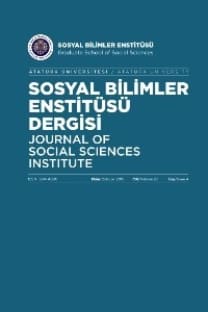İbn Sina'nın selbî yorumlama metodu
İbn Sina’nın selbî yorumlama metoduna göre; Tanrı özü itibarı ile her herhangi bir olumlu sıfatla nitelendirilmemelidir, Onun herhangi bir olumlu sıfatını anlamlandırırken, olumsuz anlamlandırma (selbî yorumlama) yapılmalıdır. İbn Sina’nın bu selbî yorumlama metodu Ortaçağ’da özellikle Yahudi filozofu Moses Maimonides (İbn Meymun) tarafından benimsenmiştir.
Avicenna's and moses maimonides' negative theology methods
According to Avicenna’s doctrine of interpretation negative theology, God should not be regarded as having any positive attributes pertaining to His essence, any positive attribute to describe Him should be given a negative meaning. Avicenna’s That doctirine of interpretation negative theology, taken over especially Jewish philosopher Moses Maimonides in the Middle Age.
___
- Altıntaş, H. (2002). İbn Sînâ Metafiziği. Ankara: Kültür Bakanlığı Yay.
- Angeles, P. A. (1981). A Dictionary of Philosophy. London: Harper & Row, Publishers.
- Atay, H. (1974). Fârabi ve İbn Sînâ ’ya göre Yaratma. Ankara: AÜ Yay.
- Bingöl, A. “İbn Sînâ’da Mantıkî Mâhiyet ve Bilinmesi”, Uluslararası İbn Türk, Hârezmi, Fârâbî, Beyrûnî ve İbn Sînâ Sempozyumu Bildirileri, (Mayıs 1990). (ss. 139–146) Ankara: Ankara Tarih Kurumu Basımevi.
- Buijs, J. A. (1988). “The negative Theology of Maimonides and Aquinas”, The Review of Metaphysics. Vol: XLI, Number: 4, s.727.
- Burrell, A. (1986). Knowing the Unknowable God: Ibn-Sina, Maimonides, Aquinas. Notre Dame, Indiana: University of Notre Dame Press.
- Cevizci, A. (1999). Ortaçağ Felsefesi Tarihi, Bursa: Asa Kitabevi.
- Delhili, R. Efendi. (1972). İzharu’l-Hak. (Çev. Ömer Fehmi Efendi ve Nüzhet Efendi). İstanbul: Sönmez Neşriyat.
- Drory, J. (Ed.) (1996).“The Early Decades of Ayyûbid Rule”, Perspectives on Maimonides: Philosophical and Historical Studies. London: Vallentine Mitchell & Co. Ltd. Press.
- Ehrenkreutz, A. S. (1996). Perspectives on Maimonides: Philosophical and Historical Studies. Kraemer Joel L. (Ed.) “Saladin’s Egypt and Maimonides”, (ss. 303–308) London: Vallentine Mitchell & Co. Ltd. Pres.
- Fârâbî. (trhs.). “Fusûsü’l–hikem”, Fârâbî. (Çev. H. Ziya Ülken ve Kivamettin Burslav), İstanbul: Kanaat Kitabevi.
- Fazlu’r-Rahman. (1990). “God and Creation: An Ecumenical Symposium.” David B. Burell and Bernard, Mc Ginn (Editors), İbn Sina’s Theory of the God-World Relationship, (ss. 50–72). Indiana: University of Notre Dame Pres.
- Gölcük, Ş. ve Toprak, S. (1988). Kelâm. Konya: SÜ İlh. Fak. Yay.
- Hyman, A. (1996). History of İslamic Philosophy I., Seyyed Hossein Nasr and Oliver Leamen (Editors). “Jewish Philosophy in the Islamic World”, (s.s.677-695). London and New York: Routledge.
- Inati, S. (1996). History of İslamic Philosophy I. Seyyed Hossein Nasr and Oliver Leamen, Routledge (Editors). “Ibn Sînâ”, (ss. 231-243) London and New York: Routledge.
- İbn Meymun. (Ed.) (1963). (Moses Maimonides). The Guide of the Perplexed I-II. Chicago and London: The University of Chicago Press.
- İbn Meymun. (Ed.)(1975). Delâletü’l-Hâirîn. (Çev. ve tahk. Hüseyin Atay). Ankara: Ankara Ünv. İlh. Fak. Yay.
- İbn Meymun. (Ed.) (1960). Makâle fi sınâ’ati’l-mantık. (Çev.ve thk. Mübahat Türker). Ankara Dil ve Tarih-Coğrafya Fakültesi Dergisi, Ankara XVIII(1–2), 9–63.
- İbn Sînâ. (1992). en-Necat II, (ilahiyat bölümü) (Tah.Abdurrahman Umeyra) Beyrut: Daru’l-Cil.
- İbn Sînâ. (1960). Kitabu’ş-Şifa, (İlahiyat), C.I-II (Tah. İbrahim Medkour, G. C. Anavati, S. Zayed), Kahire.
- Kuzgun, Ş. (1984). İbn Sina. Ahmet Hulusi Köker, Cihat Tunç (Ed.). “İbn Sina’nın Hayatı ve Milliyeti”, Kayseri: Erciyes Üniversitesi Matbaası. ss.3–25.
- Küken, G. (1996). İbn Rüşd ve St. Thomas Aquinas Felsefelerinin Karşılaştırılması. İstanbul: Alfa Basım Yayım Dağıtım.
- Leaman, O. (1990). Moses Maimonides. London: Routledge.
- Leaman, O. (1992). Ortaçağ İslâm Felsefesine Giriş. (Çev. Turan Koç). Kayseri: Rey Yayıncılık.
- Leibowitz, Y. (1989). The Faith of Maimonides. (English translation by John Glucker) Israel: Naidat Press Ltd.
- Levinger, J. (1990). Studies in Maimonides. Isadore Twersky (Ed.). “Was Maimonides “Raıs Al – Yahud” in Egypt”, (ss. 83-92) London: Harvard University Pres.
- Novak, D., (1999). “The Mind of Maimonides, “First Things 90: The Journal of Religion and Public Life, 27–33.
- Pines, S. (1963). “The Guide of the Perplexed: With an İntroductory Essay.” The Philosophıc Sources of The Guide of Perplexed, Chicago and London: the University of Chicago Press.
- Ravıtzky, A. (1990). “Studies in Maimonides.” Isadore Twersky (Ed.) The Secrets of the Guide to the Perplexed: Between the Thirteenth and the Twentieth Centuries”, (ss.159– 205). London: Harvard University Press.
- Ross, D. (2002). Aristoteles, (Çev. Ahmet Arslan, İhsan Oktay Anar, Özcan (Yalçın) Kavasoğlu, Zerrin Kurtoğlu). İstanbul: Kabalcı Yayınevi.
- Sarıoğlu, H. (1993). İbn Rüşd ve Felsefesi. (Yayımlanmamış Doktora Tezi), İstanbul, Türkiye.
- Schumacher, E. F. (1990). Aklı Karışıklar İçin Klavuz. (Çev. Mustafa Özel). İstanbul: İz Yayıncılık.
- Stern, J. (2000). “Maimonides and the Sciences.” Robert S. Cohen and Hilel Levine (Ed.). Maimonides on Language and the Sciences of Language, (ss.170–184). Boston, London: Kluwer Academic Publishers.
- Strauss, L. (1963). The Guide of the Perplexed: With an İntroductory: Essay. “How to Begin to Study the Guide of the Perplexed”, Chicago and London: the University of Chicago Press.
- Şeşen, R. (1987). Salâhaddîn Eyyûbî ve Devlet. İstanbul: Çağ Yay.
- Tunç, Cihat. (1984). “İbn Sînâ’da Zorunlu Varlık”, İbn Sînâ Kongresi Tebliğleri, Kayseri: EÜ Matbaası.
- Türker, M. (1956). Üç Tehâfüt Bakımından Felsefe ve Din Münasebeti. Ankara: T.T.K. Basımevi.
- Türker, M. (1960). “İbn Meymun, Makâle fi sınâ’ati’l-mantık”. (Çev. ve tahk. Mübahat Türker), “Giriş”, Ankara Dil ve Tarih-Coğrafya Fakültesi Dergisi, Cilt: XVIII, (1–2), 20–21.
- Ülken, H. Z. (1946). İslâm Düşüncesi. İstanbul: İÜ Edebiyat Fak. Yay.
- Weber, A. (1993). Felsefe Tarihi. (Çev. H.Vehbi Eralp). İstanbul: Sosyal Yay.
- Wolfson, H. A. (2001). Kelâm Felsefeleri. (Çev. Kasım Turhan). İstanbul: Kitabevi Yayıncılık.
- ISSN: 1304-4990
- Yayın Aralığı: Yılda 4 Sayı
- Yayıncı: Atatürk Üniversitesi Sosyal Bilimler Enstitüsü Müdürlüğü
Sayıdaki Diğer Makaleler
Turgut Özakman'ın Şu Çılgın Türkler romanındaki Erzurum'lular
Fakir Baykurt’un Yılanların Öcü Adlı Romanına Oluşumsal Yapısalcı Bir Yaklaşım
Bankaların Yeni Risk Düzenlemeleri Kapsamında Basel II ve Kobiler
Kars Şüregel’de Yerleşen Topluluklar
Turkish textbooks dialogues and comparable authentic conversations
Türkiye'de kamu harcamaları ve büyüme ilişkisi: Sınır testi yaklaşımı
Selim BAŞAR, Özgür POLAT, M. Sinan TEMURLENK, Hayati AKSU
Türkiye Türkçesindeki Farsça Sözcükler ve Kullanım Şekilleri
Yabancı Dil Eğitimi Açısından Karşılaştırmalı Yazın Çalışmalarının Önemi
